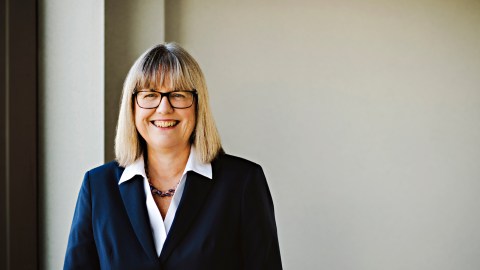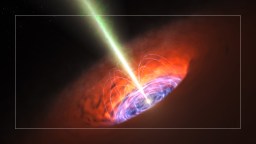A fabulous combination

Universtiy of Waterloo
When Broadview magazine visited Westminster United Church in Waterloo, Ont., for a story on Donna Strickland, who won the 2018 Nobel Prize in Physics, reporter Alanna Mitchell got a nice glimpse of the human—and humorous—side of the internationally acclaimed scientist.
Strickland’s friend Lynn Macaulay told Mitchell, “Donna is so down-to-earth and real. And now here she is, having you here on the day she’s handing out hymn books and turning on the lights and making sure the washrooms are all clean. Because, what else would a Nobel Prize laureate be doing? But when you’re Donna, that’s what you would be doing!”
Macaulay then turned to Strickland and said, “Right, Donna? Because you are just so fabulous!”
Strickland laughed and replied, “Yeah, I’m just so fabulous.”
Awarded the Nobel for her work on a new type of laser, Strickland did the Broadview interview while prepping her church for morning worship. Her fabulousness does not fit our preconceived notions of “geeky scientist” whatsoever.
Strickland, 59, a physicist at the University of Waterloo, is lay coordinator of Sunday morning services at Westminster United. Church leaders released her from her duties as chair of their governing council to devote her time to her new responsibilities as a Nobel laureate.
Her Nobel Prize is significant for several reasons. First, she won it for work done as a Ph.D. candidate—meaning that it’s not just the senior scholars who win the big award. Secondly, she is only the third woman to win the Nobel for physics, joining Marie Curie (1903) and Maria Goeppert Mayer (1963).
What’s not so unique, though, is her Christian faith among Nobel laureates. Estimates suggest that as many as 65 percent of Nobel winners between 1901 and 2000 were Christians. Not surprisingly, the Peace prize is highest. And while one might think that Christians are least represented among the sciences, that distinction actually goes to winners in Economics and Literature. More than two-thirds of Chemistry, Physics, and Medicine winners were Christian. While this is likely more of a measure of religious affiliation and not measure of devotion or orthodoxy, it appears that Strickland is more the norm and less the anomaly when it comes to her faith.
It’s significant that many Christians are winning the biggest awards in science. Their work is important for those of us seeking to help the Christian community and our wider culture overcome the (mis)perception of conflict between science and faith.
The influence of a star scientist
Celebrity scientists can impact the way we perceive the relationship between faith and science. A 2015 study of more than 10,000 American adults showed that a prominent Christian scientist was more convincing than a prominent atheist scientist in the science vs. religion “debate.”
Of the people surveyed, some were primed with a summary of Francis Collins’ perspective, and others with a summary of Richard Dawkins’ perspective.
The Collins description read: “Dr. Francis Collins is a geneticist who has directed the Human Genome Project and the National Institutes of Health. Dr. Collins is also an outspoken Christian who has said that God is capable of performing miracles and that religion and science are ‘entirely compatible.'”
The Dawkins description read: “Dr. Richard Dawkins is an evolutionary biologist and emeritus fellow at Oxford University. Dr. Dawkins is also an outspoken atheist who has said that the existence of God and miracles is ‘very improbable’ and that religion and science are in conflict with each other.”
Other participants were not primed with either statement, but all were asked to indicate their view of science and faith and given four options for answers: “My understanding of science and religion can be described as a relationship of 1) conflict … I consider myself to be on the side of religion; 2) conflict … I consider myself to be on the side of science; 3) independence … they refer to different aspects of reality; 4) collaboration … each can be used to help support the other.”
Even though 21 percent of participants had heard of Dawkins, compared to only 4 percent familiar with Collins, the favored response was strongly “collaboration”—the position embraced by Collins.
Additionally, being primed by Collins seemed to actually change some people’s minds. For those participants unfamiliar with Collins, 49.8 percent of those primed by his description endorsed collaboration, and 35.3 percent who were not primed also endorsed collaboration. Meanwhile, for those who were unfamiliar with Dawkins, learning about him had almost no effect. Of those who weren’t primed with a Dawkins description, 10.7 percent endorsed his conflict view in favor of science; of those who were primed with Dawkins, 12.4 percent endorsed this view.
Analyzing the findings, psychologist Tania Lombrozo concludes, “Celebrity scientist opinions can have an influence on how people think about the relationship between science and religion.”
Though Collins had the more persuasive effect on participants, we can’t know how enduring it is—did it really change minds, or just one’s response on a survey? Still, it suggests that more scientists like Collins and Strickland can help those of us seeking to change the way church and culture engage science.
And, to quote Strickland and her friend, that would be fabulous.
The post A Fabulous Combination appeared first on ORBITER.





